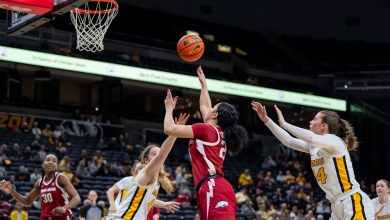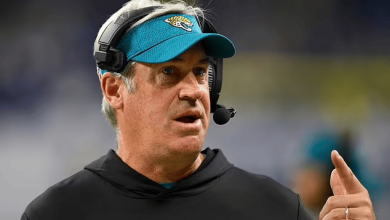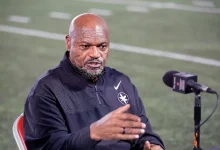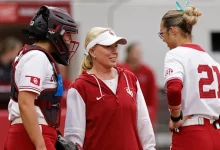President Donald Trump Reportedly Planning to Launch Presidential Commission to Oversee and Monitor College Sports.
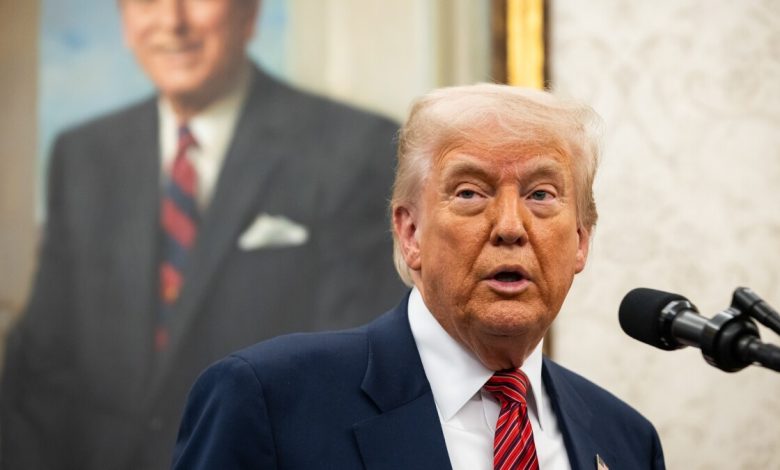
In a bold move that could reshape the future of collegiate athletics, former President Donald Trump is reportedly planning to establish a Presidential Commission dedicated to overseeing and monitoring college sports across the United States. Sources close to Trump’s political circle have indicated that the proposed commission would aim to standardize regulations, enforce gender-based participation rules, and ensure equity and transparency in student-athlete compensation—especially in light of the burgeoning Name, Image, and Likeness (NIL) industry.
The proposal comes amid mounting national debate about the commercialization of college sports, transgender athlete participation, and the rapidly evolving legal and financial framework that now governs NCAA institutions and student-athletes. While Trump has long been a polarizing figure in education and sports policy, his supporters say this new effort is about restoring “fairness” and “integrity” to college competition. Critics, however, view it as a political maneuver that could erode institutional autonomy and further polarize public discourse.
The Vision Behind the Commission
According to initial reports, the envisioned Presidential Commission on College Sports would function similarly to previous federal oversight bodies in other domains, such as education reform or public health. While details are still emerging, the overarching goals of the proposed commission include:
- Regulating NIL Agreements Nationwide
Trump’s team has expressed concerns that the current NIL landscape—where athletes are paid for their endorsements, appearances, and personal branding—is creating wide disparities among institutions. Supporters of the commission argue that standardized federal guidelines could ensure fairness, reduce corruption, and prevent recruiting abuses. - Gender and Eligibility Oversight
The commission would also play a central role in enforcing federal rules concerning the participation of transgender athletes. This aligns with Trump’s earlier executive actions that sought to prohibit transgender women from competing in women’s sports—a position his campaign has pledged to uphold if he returns to office. - Monitoring Athletic Department Operations
Another central component would be the establishment of transparency benchmarks for college athletic programs, including scholarship distribution, coaching contracts, recruiting practices, and revenue-sharing policies. - Stakeholder Collaboration
The commission is expected to include representatives from universities, athletic conferences, student-athlete advocacy groups, and legal experts to provide guidance and ensure the commission’s recommendations are grounded in both practical and ethical frameworks.
The Push for Federal Involvement
While the NCAA remains the primary regulatory body for college athletics, the Trump initiative reflects a growing belief among conservatives that federal action is needed to counterbalance what they view as liberal overreach in education and sports. In recent speeches and media appearances, Trump has repeatedly argued that college sports are “under siege” from “woke policies” and “unfair practices,” particularly in the realms of gender identity and pay equity.
Supporters of Trump’s plan claim the NCAA has become ineffective at managing the complex interplay between law, athlete rights, and institutional responsibility. They point to inconsistent state-level NIL laws, disputes over athlete unionization, and controversial inclusion policies as evidence that a centralized federal entity is needed to restore competitive balance and legal clarity.
Who Might Lead the Commission?
Though no official appointments have been made, reports suggest that several high-profile figures are being considered for leadership roles within the commission. Among them:
- Nick Saban, the recently retired head coach of Alabama’s football team, is rumored to be a top choice. His reputation as a disciplinarian and advocate for athlete development aligns with the commission’s goals.
- Betsy DeVos, Trump’s former Secretary of Education, may be tapped for an advisory role due to her experience in federal education policy.
- Herschel Walker, former NFL star and Senate candidate, has also been mentioned, particularly as a potential liaison to athletic departments and minority-serving institutions.
If confirmed, this would mark one of the most prominent federal efforts to exert influence over college sports since the inception of Title IX in 1972.
NIL, Title IX, and the Law
The emergence of NIL deals in 2021 upended traditional notions of amateurism in college sports. For decades, athletes were prohibited from earning money for their athletic prowess outside of scholarships. The NIL revolution changed that, opening the door to potentially lucrative brand partnerships and social media deals.
While many hailed this change as long overdue, critics—particularly conservatives—have warned that the system is spiraling out of control. Wealthier programs now have massive recruiting advantages due to alumni-funded NIL collectives, raising concerns about equity, tampering, and the erosion of the “student-athlete” model.
Additionally, the Trump administration’s prior rollbacks on Title IX guidance, especially concerning gender identity, drew fierce backlash from LGBTQ+ advocacy organizations and civil rights groups. A federal commission enforcing stricter gender classifications in sports participation would likely reignite legal battles across the country, as courts continue to interpret Title IX protections more broadly.
Criticism and Legal Challenges
Critics argue that Trump’s proposed commission is more about politics than policy. Opponents fear that the effort will serve as a Trojan horse to dismantle protections for transgender athletes, restrict institutional autonomy, and politicize decisions that should remain under the purview of academic administrators and professional sports organizations.
The American Civil Liberties Union (ACLU) and Human Rights Campaign have already issued preemptive statements denouncing the proposal, warning that any attempt to exclude athletes based on gender identity would be met with “immediate and forceful legal challenge.”
University leaders, too, are divided. While some administrators have welcomed the idea of national NIL oversight, others worry that inviting the federal government into college athletics could create bureaucratic bottlenecks, erode competitive independence, and trigger a wave of regulatory compliance costs.
A Political Play or Lasting Reform?
With the 2024 presidential election cycle behind us and Trump reportedly preparing for a return to public service or political kingmaking, many see the commission as part of a broader strategy to solidify his base. The issue of transgender athletes, in particular, has become a potent rallying cry for many conservatives, and Trump’s advocacy on this front may help energize support among voters who feel sidelined by progressive policies.
At the same time, the NIL debate crosses political boundaries. Lawmakers from both parties have expressed concern that the current NIL ecosystem is chaotic and unfair, and several bipartisan bills have been introduced in Congress aiming to regulate it. Trump’s proposed commission could therefore serve as a springboard for more formal legislative action—if he can build a coalition around it.
The Future of College Sports
What happens next is uncertain. If the commission is formally launched, it could pave the way for sweeping reforms that redefine college sports in the U.S. forever. But it also risks deepening political divisions and undermining the collaborative structures already in place at the NCAA and individual institutions.
For athletes, the consequences could be just as mixed. On one hand, federal NIL oversight could offer more protection and fairness. On the other, restrictive policies on eligibility, gender identity, and institutional control could reduce opportunities and spark resentment.
In the end, the success or failure of Trump’s commission may depend less on politics and more on execution: Will it truly help athletes and institutions? Or will it become another flashpoint in America’s ongoing culture wars?
President Donald Trump’s reported plan to launch a Presidential Commission to oversee and monitor college sports is a bold, potentially disruptive initiative with wide-ranging implications. Whether it’s viewed as a necessary corrective to a broken system or an ideological overreach into academia and sports, one thing is clear: the battle over the soul of college athletics is far from over.




